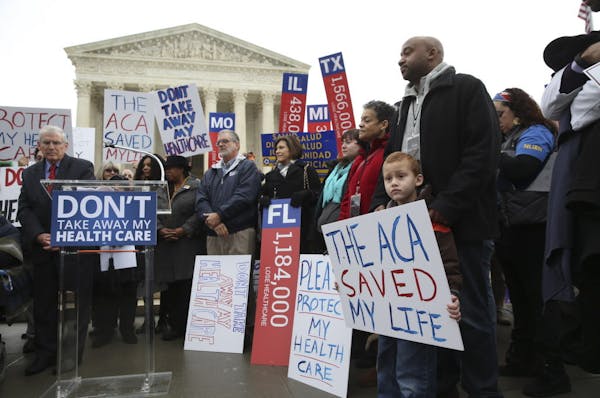A potential decision by the U.S. Supreme Court to eliminate tax credits on the federal government's HealthCare.gov website could shed light on the yawning gap in premiums between the Twin Cities and western Wisconsin.
A 40-year-old nonsmoker who lives just west of the St. Croix River can purchase the "benchmark" plan through the state's MNsure health insurance exchange for $183 per month, according to data from the Kaiser Family Foundation.
But the comparable policy for a similar consumer on the east side of the river pays $379 per month — more than twice as much.
Subsidies provided by the federal Affordable Care Act even out these regional differences. Tax credits are designed to make sure that similar consumers across the country pay no more than a set percentage of their income on health insurance.
So, if the Supreme Court were to decide to eliminate tax credits in states covered by the federal government's exchange, it could result in more Wisconsin residents confronting the state's higher market prices, said Cynthia Cox, a researcher with the Kaiser Family Foundation.
"Wisconsin premiums are higher on average relative to the rest of the country — and particularly relative to Minnesota," Cox said. The gap in unsubsidized premiums between the Twin Cities and St. Croix County likely is "the widest variation that exists in neighboring areas," she said.
On Wednesday, the court heard oral arguments in a case where critics say the health law only makes tax credits available to consumers in states like Minnesota that operate their own health insurance exchanges.
More than 35 states, including Wisconsin, opted not to create new marketplaces, so residents buying non-group coverage in those states can purchase through HealthCare.gov.
Tax credits are available only to exchange shoppers with incomes below 400 percent of poverty — a threshold that works out to about $46,000 for an individual, and roughly $95,000 for a family of four.
Dannette Coleman, a senior vice president with Minnetonka-based Medica, said the gap in premiums between the Twin Cities and western Wisconsin narrowed between 2014 and 2015, but persists for several reasons.
Minnesota has broader public health insurance programs that effectively remove many lower-income consumers from the MNsure exchange. Lower socioeconomic status corresponds with greater health risk, Coleman said.
Conversely, Wisconsin has rules that let some individual market consumers retain policies they purchased before 2014. The rules effectively keep those healthier consumers out of the HealthCare.gov market, Coleman said.
A final factor is that Minnesota premiums could be artificially low. Coleman noted that MNsure's largest carrier for 2014, PreferredOne, pulled out after concluding its premiums weren't sustainable.
In a three-county region of Wisconsin close to the Twin Cities, about 3,000 people last year bought policies through HealthCare.gov, Cox said. It's not clear how many of those shoppers got tax credits, but across Wisconsin about 90 percent of those buying through the federal exchange received subsidies.
If the Supreme Court's decision winds up blocking tax credits through the federal exchange, the lack of financial assistance could result in relatively healthy people in those states opting not to buy coverage, Cox said. The lack of those consumers, in turn, could prompt insurers to hike premiums or drop out.
"If there becomes less of a market, carriers will go where there's a market," Coleman said. "So, there could be a lot of unforeseen fallout with that sort of a decision."
Insurance agent Dennis Conger of Stillwater predicted that many in Wisconsin would find their policies unaffordable without tax credits because "the pricing is so much more right across the river here."
But Conger also has been reading about proposals from Republicans in Congress that might delay any such impact for consumers.
"Do I think that that Supreme Court decision, if it went against the [health law], would have an immediate effect? There would be a political scurry, but I suspect not," Conger said. "However, I think it would have a profound affect moving forward, because basically the President and the Democrats would have to work with the Republican-controlled [Congress] to come up with a Plan B."
Christopher Snowbeck • 612-673-4744
Twitter: @chrissnowbeck

Minnesota Sports Hall of Fame: A class-by-class list of all members

This retired journalist changed professional wrestling from Mankato

